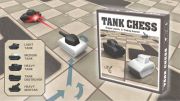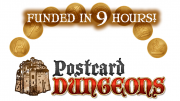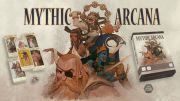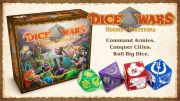Christmas Lights (Adam Collins) – The game consists of two sets of cards: the pattern deck and the bulb deck. The pattern deck shows what pattern of lights a player must collect. You have to complete three patterns in order to win the game. The bulb deck has six different colored lights, broken lights, and plug lights. Each player is dealt five cards. You hold your cards so that your opponents can see them but you cannot. On your turn there are three phases. During the first, you choose to trade one of your cards with an opponent. Once the cards are traded, both players can look at the cards, before placing them in their hands so that once again, all other players can see them but they cannot. During the second phase, you can place one card from your hand face up in front of you. If it matches your pattern card it remains; if it does not, it must be discarded. Finally, you can place a card face up in the middle of the table and draw a card from the bulb deck to place beside it. You may choose either card to place in your set or you can use them to trade with another player in exchange for information about the cards in your own hand. Finally, you draw up to five cards and play passes to the player on your left.
Casual Game Crowdfunding: Christmas, Unicorns, and Tanks

As the year wraps up, Kickstarter brings us some Christmas festivities! There’s also a new take on Chess and a dungeon crawler with a board the size of a large postcard.
Kill the Unicorns (Morning Players) – Players are hunting unicorns. Each of you chooses a character and draws two scheme cards from your decks. Players then take turns placing one scheme card face down on a unicorn card of their choice. Players then choose hunt cards to place face down in the hunt of a unicorn. The player with the strongest attack should win that unicorn, but scheme cards are revealed at the same time as hunt cards and these can affect the outcome of the hunt! After the hunts, players can go to the black market to use their remaining cards to buy items that will increase the value of the unicorns they've caught.
Tank Chess (Forsage Games) – Chess meets tanks in Tank Chess. Each player has several tanks on the board. On a turn, a tank can move forward and rotate in place. Pieces can also reverse one single square. There are heavy and light tanks that can move different distances. Tanks can shoot opponents that are at a distance but can't shoot tanks that are directly next to them. Some tanks have turrets which can aim in three different directions, while others can only shoot straight forward, and some tanks can shoot over obstacles with mortars. Depending on the tank's class, it can be destroyed from different angles. A player can win by destroying his opponent's command tank, but also by escaping with his own command tank. One side of the board comes with set obstacles, while the other side lets you place the obstacles for yourself.
Postcard Dungeons (Joseph Limbaugh) – Postcard Dungeons isn't just a dungeon crawler game that can be played in 30 to 45 minutes, each dungeon is also the size of a large postcard! Each player chooses one of three dungeons and rolls three dice to populate it with traps, monsters, and spells. You then roll another three dice and assign them to your three heroes. You then choose one at a time what your hero will do in your dungeon as they attempt to gather treasure. The winning player is the person with the treasures that adds up to the most victory points at the end of three rounds.
Mythic Arcana (Tau Leader Games) – Deity cards are placed on the table face up. You summon them into your pantheon based on what you roll on the dice. You must collect one god of each type to win. Each god has a special ability. Some occur as soon as you claim them; some have abilities you can use multiple times (such as adding to your dice rolls); some have an ability that requires you to exhaust a god in order to use it; and some have destruction abilities, that occur when a god is destroyed, which can make attacking an opponent's pantheon with a god ability a dangerous proposition.
Dice Wars (Wiz Dice) – In this two player tactics game, you determine your army by taking seven large dice and rolling them. What you roll are which units you will have in your army. You then create the map using the game's nine tiles, which can be shuffled and randomized. There are three ways you can win: either by killing your opponent's hero unit, killing their last non hero unit, or capturing three cities and holding them through three turns.
Disclosure: unless otherwise noted, we have not seen or played any of the above games. Our assessment of each is based on the information given on the crowdfunding project page.










